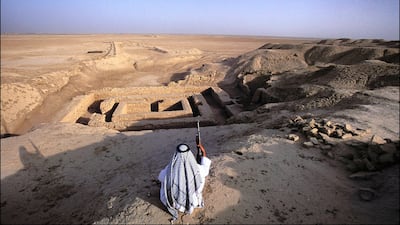The Near East has been a dynamic theatre of humaity's progress since antiquity. It is here, ringed in by the Mediterranean Sea to the West, the Black Sea to the north and the Caspian Sea to the east, that the earliest and most sophisticated civilisations arose, the written script was invented, empires were born and ideas that continue to this day to influence the world originated. Its successes propelled its peoples outwards in pursuit of new conquests and made it prey to outsiders. Civilisations erected by settled populations were disrupted by predatory nomads. The collisions and cross-pollinations generated new, hybrid ways of life. Civilisation piled upon civilisation. But old beliefs survived and found expression in new faiths. The biblical legend of the great flood, for instance, had its genesis in Sumerian mythology.
Our knowledge of this region's ancient past has been shaped by relatively recent discoveries. There are a handful of books for readers seeking an introduction to this history. Chester Starr's Early Man: Prehistory and the Civilisations of the Ancient Near East was an elegant and accessible historical overview but appeared in 1973. Hugh Kennedy's history of the Near East has been in publication since it first appeared in 1986. More recently, Conor Kostick edited an excellent collection of essays on the subject.
What distinguishes Arthur Cotterell's The Near East: A Cultural History is its sweep. Whereas previous books dealt with periods, events and personalities, The Near East sets out to tell the whole story, from the beginning of civilisation itself to the present.
____________
Read more:
Book review: Yuki means happiness is a love letter to a Japanese way of life
Book review: Erika Rappaport's A Thirst for Empire: How Tea Shaped the Modern World
Book review: Fiona Melrose's Johannesburg
____________
Cotterell began this project when passengers on a Mediterranean cruise asked him to recommend a book on the region. He realised there was no primer for a general readership. He resolved to write it. Coterell, author of the Penguin Encyclopaedia of Ancient Civilisations, has published more than 30 books, most of them on classical civilisations. The Near East is enlivened by insights amassed over a lifetime of engagement with the subject.
The book is divided into three sections – the ancient, the medieval and the modern. Cotterell briskly outlines the archaeological breakthroughs that have shed new light on the antiquity of the Near East. The foundation of Uruk in 3200 BC – "a turning point in human development" – is beautifully sketched out in a chapter on the Sumerians, who "shaped the consciousness of the ancient Near Eastern peoples". Geography favoured them in what is today southern Iraq. Agriculture flourished and was mechanised. Uruk, the world's first city, inaugurated an "urban revolution". And Mesopotamia became a cradle of civilisation.
By 2334 BC, the Sumerians were routed by Sargon of Akkad, the world's first empire builder, who created a properly bureaucratic political entity. The Akkadians traded with India and Egypt, and Sumer was reduced to an imperial province of Sargon's expanding empire. This is the inception of the pattern of history – civilisation, conquest, assimilation, urbanisation, expansion – identified by the great medieval North African historiographer, Ibn Khaldun. The ascent and collapse of the Assyrians and Babylonians followed this template. The first "holy war" with Europe was undertaken by Persia, whose Zoroastrian ruler Darius and his son Xerxes viewed the conquest of Greece as a religious obligation.
The medieval period deals with the arrival of Islam, the Crusades, the dissolution of the Byzantine Empire and rise of the Ottoman Empire. Cotterell draws attention to the pluralism of the region in 7th Century AD. His descriptions of the subsequent disruptions is accompanied by reminders of civilisational continuities. As Europe descended into the Dark Ages, Muslim scholars preserved and translated classical Greek learning.
The final portion of the book, from the Great War to the present, is its weakest section. Cotterell's strength is classical history, and he never misses the opportunity to return to it. A subchapter on Ataturk's Turkish nationalism turns into an exploration of the Christian roots of racial chauvinism, with reflections on Noah.
There are cursory chapters on the Arab Spring, ISIL and the Israel-Palestine conflict. Contemporary Arabian Gulf states are dealt with in two pages, in the style of a tourist guide. This section performs no function other than validate, in the most perfunctory manner, Cotterrell's claim that his is an all-encompassing work. Its omission might have improved the book considerably. Its inclusion, however, does not subtract from the fact that Cotterell has given us, in this beautifully illustrated and handsomely produced book, an impressive introduction to the history of the near east.

